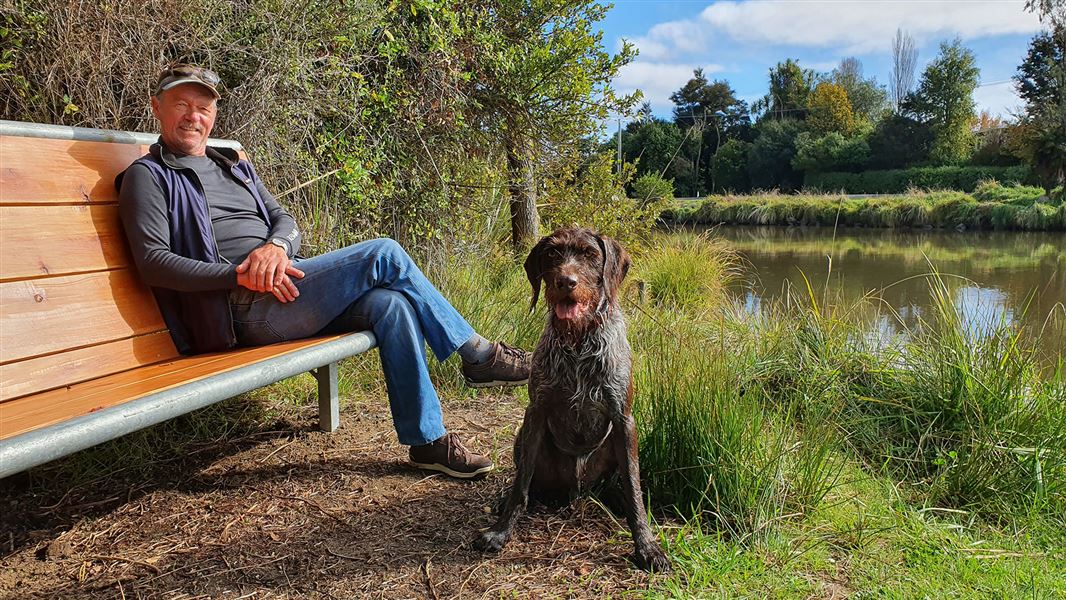Archived content: This media release was accurate on the date of publication.
Date: 30 May 2022
The scientist and outdoorsman
As a passionate fisherman and hunter Michel’s career as a fishery scientist with DOC has been far more than just a job. A true outdoorsman at heart, he successfully combined scientific research with a love for the forests, lakes, and rivers of the central plateau.
The Taupō trout fishery became one of the most studied freshwater fisheries in the world and the research carried out here has informed countless international studies. Over the course of his career Michel co-authored many scientific papers, contributed to a book entitled Understanding Recreational Fishers, addressed international fishery conferences, and was placed on an expert panel of international fishery advisers by the United Nations.
Michel may have retired but his enthusiasm for the fishery remains tangible and is matched only by his understanding of the systems and processes that drive it.
With a doctorate in ichthyology (the study of fish) Michel landed his dream job as the Taupō fishery scientist in autumn 1992. On arrival with his young family, he discovered a fishery that exceeded all expectations - the water was clearer, the trout were bigger and the landscapes far more beautiful than he ever imagined. He knew this was a very special place.
From a management perspective he discovered a rich supply of fishery data had already been collected. Records of fish size dated back to 1896, when rainbow trout were first introduced to the region. With an awareness of the historical data Michel set out to further increase understanding of the fishery with regular monitoring programmes.
Ongoing research
The Waipa spawning trap was introduced on a headwater stream of the world famous Tongariro River. Information gathered included the number of trout, their sex, length, weight and iteroparity (how many times individual fish have spawned). Escapement counts, also known as drift dives, were introduced to capture information about trout spawning runs in other significant rivers.
More recently Lake Taupō productivity information was added to the mix, using a powerful echo sounder towed behind a boat as it navigated a series of set transects. From a social science perspective, angler satisfaction surveys were established.
Analysis of all this data allowed Michel to understand how the fishery was changing over time. Importantly, the results helped inform fishery management decisions and shape fishing regulations.
Specific studies
In addition to this ongoing monitoring work, Michel initiated specific studies designed to investigate particular issues. A recent example was a two-year study at Lake Otamangakau prompted by increasing trout deaths during hot weather. The project involved monitoring temperature and dissolved oxygen levels, a series of catch-and-release survival studies, an assessment of angling pressure and review of angler surveys.
Towards the end of his career Michel’s work increasingly focussed on how human behaviour impacted the fishery. How changing licence fees or regulation changes impacted trout populations and fishing quality.
Support and collaboration
Michel has always been grateful to the Fishery Managers who supported his scientific work and the team members who carried out the mahi and helped capture data. He also valued the network of science collaborators from around the world who generously shared their time and expertise and the many Taupō anglers who provided important feedback and helped deliver change by responding to regulation changes.
A sustainable future
The sustainability of the fishery has been an important goal for Michel. He believes good fishery management is about trying to deliver the best results for anglers and other stakeholders. Data can help us understand what is going on, but then we must work with angler representatives and stakeholders (on the Taupo Fishery Advisory Committee) and directly with iwi (through The Tūwharetoa Māori Trust Board) and local hapu.
While Taupō remains a wild trout fishery with many complex factors driving change, we now have a much greater understanding of the relationship between anglers and trout populations, and the measures we must take to protect the future of the fishery. Michel hopes this will be his legacy – robust data underpinning inclusive management processes which deliver a truly sustainable trout fishery.
